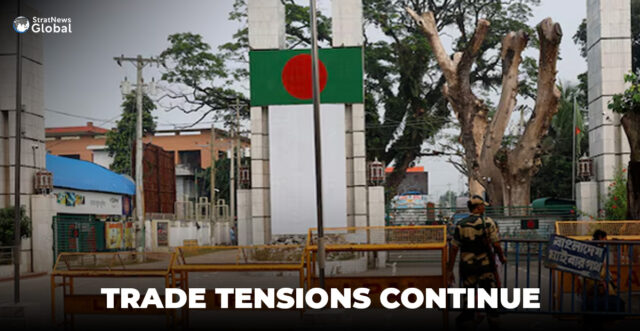India on Friday imposed restrictions on the import of certain jute products and woven fabrics from Bangladesh via all land routes, a move that comes amid growing tensions between the two countries.
According to a notification from the Directorate General of Foreign Trade (DGFT), these items can now only enter India through the Nhava Sheva seaport in Maharashtra.
The restricted list includes jute products, flax tow and waste, jute and other bast fibres, single flax yarn, various jute yarns, and woven jute fabrics, including unbleached varieties.
However, the new restrictions will not apply to Bangladeshi goods transiting through India to Nepal and Bhutan.
The DGFT clarified that re-export of these restricted products from Bangladesh to India via Nepal and Bhutan would be prohibited.
“Imports from Bangladesh through any land port along the India-Bangladesh border are banned. Only shipments through Nhava Sheva port will be permitted,” the DGFT stated, adding that the restrictions are effective immediately.
Ongoing Trade Tensions
This is not the first such move by New Delhi. In April and May, similar curbs were announced, including restrictions on the import of garments and processed food from Bangladesh.
Earlier, India also revoked Bangladesh’s transhipment facility for exporting goods to regions like the Middle East and Europe, with exceptions for Nepal and Bhutan.
These trade measures follow controversial remarks made by Bangladesh’s interim leader, Muhammad Yunus, during his visit to China, which triggered widespread backlash in India.
Relations between the two neighbours have deteriorated significantly, particularly after Dhaka’s failure to curb violence against minorities, especially Hindus. Bangladesh’s expanding ties with Pakistan and China have also raised concerns in New Delhi.
Bangladesh remains a major competitor to India in the textile industry. Bilateral trade stood at $12.9 billion in 2023-24, with India’s exports to Bangladesh accounting for $11.46 billion and imports at $2 billion.
Sources say India’s strained ties with Bangladesh and its growing proximity to China and Pakistan were also discussed during a parliamentary committee meeting on Friday.
(With inputs from IBNS)





